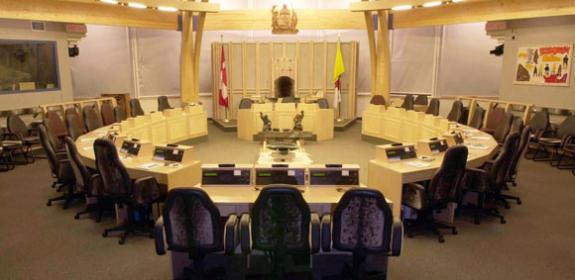
Nunavut Election 2017
Welcome to the first instalment of the Nunavut Election Newsletter for the Territorial Election on October 30, 2017. Thanks for dropping by. Feel free to share the newsletter with others or let us at the Canadian Elections Database know what you think. Email and information links are available at the bottom of the page.
Special thanks to our northern politics expert, Professor Graham White of the University of Toronto, for leading this project. How far north are we going? Well, to a place that recently received a note from Russia describing the debris field that will result from its latest rocket test... North Korean rockets don't reach this far…do they?
Let's get to the election.
No Political Parties?
Only those who really, really follow Canadian politics – in all its glories and ... non-glories – will be aware that a general election is underway in Nunavut to elect the 22 members of the Nunavut Legislative Assembly on October 30th from among 72 candidates. Like so much else about Nunavut, this election combines much that is familiar to election groupies in the south and some that is a tad unusual. There is plenty of useful information at Elections Nunavut, including how the Territory makes regular use of plebiscites to decide important policy questions.
Let’s begin with the defining feature of this election and indeed of the operation of the Nunavut legislature and government: the absence of political parties. No political parties? No big deal, you might think: most Canadian cities also lack parties. True enough, but they don’t operate in a Westminster-style parliament with ‘responsible government’, with a premier and cabinet ministers who gain and retain power by maintaining the ‘confidence of the House’ – winning key votes. Westminster-style legislatures without parties are rare, though a few exist, including Nunavut’s next-door neighbour, the Northwest Territories (this is hardly an accident seeing as how Nunavut was carved out of the NWT in 1999).
But if there are no parties, and thus no winning party after the election, who picks the premier and ministers who make up cabinet? The premier and the cabinet are voted in by secret ballot of all MLAs who meet shortly after the election. Notice that this means that, unlike in party-based systems, the premier does not select her or his ministers. Can’t fire ‘em either.
Think about that for a bit. This is a very different take on the power of the executive that generates so much negative commentary. On the other hand, how likely are those who voted a cabinet into office to turn around and vote it out? Lots to think about.
Without parties, there is no government to defend its record at election time and no opposition to criticize the government’s record and promise to do better. All incumbent MLAs, including ministers, run as independents, though of course a minister’s performance in office will factor into his or her chances of re-election.
If there are no parties, party platforms or party leaders, how do voters know what the incoming government might look like, including who will lead it and what its policies will be? That’s easy: they don’t. They can speculate of course but with so many complicating factors most don’t bother and just have to hope that whoever controls the levers of power after the election can work together and that they can deal with Nunavut’s many serious issues.
That is where we will head in the next instalment in a few days, when we will look at how elections without political parties work.
Before you go, you might be interested in a short, astute analysis of previous Nunavut elections: Graham White, “The Territories” in Jared J. Wesley. ed., Big Worlds: Politics and Elections in the Canadian Provinces and Territories (Toronto: University of Toronto Press, 2016). If you are interested in results from previous Nunavut elections, you can check out the CED and click on Nunavut. We will be back shortly.
More information
- For real keeners, the best source of election coverage is the absolutely terrific Iqaluit-based newspaper, Nunatsiaq News.
- The CBC North Nunavut website usually has a section dedicated to election news but so far, no sign of it.
- Contact the Canadian Elections Database team at
